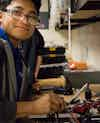The Challenge
Even for students who don’t choose technical careers, STEM skills are survival skills for kids today, and an incomplete understanding of STEM is an incomplete understanding of the world. The problem of an insufficient number of STEM graduates is high-stakes. There are very real connections between America’s ability to train the next generation in STEM and our nation’s competitiveness.
The problem is multi-faceted. The number of U.S. jobs in STEM is growing three times faster than non-STEM jobs, with a projected 9 million STEM jobs needing to be filled by 2022. Meanwhile, with 18% of bachelor’s degrees being conferred in STEM subjects, we are not projected to graduate enough STEM professionals to meet the demand. The bottom line is that the majority of students entering college in the U.S. are not ready for college-level math or science, let alone a career in a STEM-related field.
- 9 millionSTEM jobs projected by 2022
The Solution
Volunteer mentor-based robotics competitions are a proven solution to engage students in STEM concepts and to build the skills required of the 21st century workforce. Not only do these competitions provide a fun, hands-on environment for students to design and build robots, they encourage teamwork and real-world problem-solving skills needed for future STEM careers.
Texas Instruments is committed to future scientists, engineers, mathematicians, and world-changers. In addition to supplying mentors and technology, Texas Instruments partners with For Inspiration and Recognition of Science and Technology (FIRST®), VEX® Robotics, and Boosting Engineering, Science, and Technology (BEST) Robotics to sponsor robotics competitions that help today’s students become tomorrow’s inventors.
- 68%of 13–18-year-olds would like math if they better understood it
A Recurring Theme
Texas Instruments, like so many other employers across the country today, believes that their company’s worth is based not only on the strength of a balance sheet, but on its contributions to community strength and economic development in the locations where it operates.
For the Love of Math
Contrary to popular belief, students actually like math. Texas Instruments polled approximately 1,000 students across the U.S., between the ages of 13 – 18, to test this theory and found that nearly twice as many students (46%) reported liking or loving math, compared to those who said they hated or disliked it (24%). A majority of students (68%) said they would like math more if they better understood it.
With this knowledge, and through partnerships with organizations across the U.S., Texas Instruments is dedicated to shifting student attitudes and achievements in STEM. They invest in developing and recognizing effective teachers, sponsor programs to expand opportunities for under-represented groups in STEM fields, and have an active program, Teachers Teaching with Technology (T3), that allows teachers to share ideas and inspire each other with effective teaching practices that revitalize classrooms.
One of the most exciting initiatives is robotics competitions. Texas Instruments believes that through these competitions students of all backgrounds can develop a passion for STEM, build incredible confidence in their own abilities, and begin to understand what is possible with even basic STEM literacy.

Critical Partnerships
Boosting Engineering, Science, and Technology (BEST) Robotics Inc.: The idea for a BEST competition originated in 1993 when two Texas Instruments (TI) engineers, Ted Mahler and Steve Marum, were serving as guides for Engineering Day at their company site in Sherman. There they watched a video of freshmen students building a robot at the Massachusetts Institute of Technology. The Engineering Day high school students were so interested that Ted and Steve said, “Why don’t we do this?” The first North Texas BEST competition was held in 1993 with 14 schools and 221 students. BEST continued to grow and is now a stand-alone 501(c)3 non-profit corporation.
REC Foundation & VEX Robotics: VEX Competitions bring STEM skills to life by tasking teams of students with designing and building a robot to play with, and against other teams in a game-based engineering challenge. Classroom STEM concepts are put to the test as students learn lifelong skills in teamwork, leadership, communications, and more. Tournaments are held year-round at the regional, state, and national levels and culminate at the VEX Robotics World Championship each April.
FIRST: The mission of FIRST® is to inspire young people to be science and technology leaders and innovators, by engaging them in exciting mentor-based programs that build science, engineering, and technology skills, that inspire innovation, and that foster well-rounded life capabilities including self-confidence, communication, and leadership.
- 91%more interested in going to college when students participate in robotics competitions
- 2xmore likely to major in science or engineering when students participate in robotics competitions
- 173,000Texas Instruments employee volunteer hours clocked
- 75%more like to major in or work in STEM fields when students participate in robotics competitions

How can other businesses get involved?
Be a mentor. Be a volunteer. Share your knowledge. The model that Texas Instruments has created is one based on a strong belief in the power of STEM literacy, an endless drive to support those in the classroom, and creative ideas about how to reach diverse communities.
By engaging with existing organizations that have already established an infrastructure of support for growing a greater STEM pipeline, Texas Instruments is able to bring the knowledge and time of their employees to that equation and add additional value.
Robotics competitions take place all across the country and are a great place for a business to get started working with students to develop a love of math and science. Research shows that students involved in robotics are more likely to take more challenging math and science courses in school, more interested in majoring in engineering, and more likely to pursue a STEM career later in life. Not only do students creatively imagine and build robots, they also learn life skills such as teamwork and problem solving that will serve them well no matter which career path they choose.




